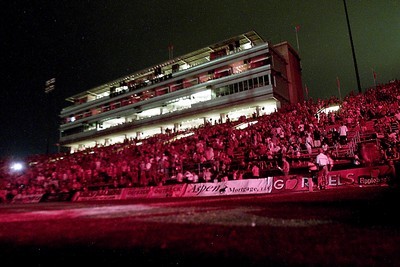The night the lights went out

The Sept. 11, 2001, terrorist attacks were still a fresh and open wound for Americans when UNLV opened the 2002 football season against Wisconsin at Sam Boyd Stadium.
As the one-year anniversary neared, a sense of unease began to creep over the country about reliving that awful Tuesday morning while worrying about the potential for an anniversary strike.
So when the lights went out at the stadium midway through the fourth quarter, many in the record crowd of 42,075 quickly wondered if another attack was taking place.
UNLV senior associate athletic director Jerry Koloskie heard such talk in the stands.
Then-coach John Robinson looked up at the press box in search of his wife, Linda.
“That’s the first thing that came to my mind was the 9/11 thing,” former Rebels defensive end Ahmad Briggs said. “I was ready to run off the field at that point because I didn’t know what was going on with the lights.”
The fears, thankfully, were unfounded.
Instead, one of the more memorable and unusual nights for UNLV football, occurred because of an old-fashioned power outage. Wisconsin was awarded the 27-7 victory after a short wait ended without the lights coming back on.
“I don’t know if that’s ever happened to anybody before,” said Wisconsin athletic director Barry Alvarez, who was the Badgers’ coach that night.
Of course, the power outage sparked conspiracy theories, some of which exist today.
Much of the suspicion is due to the heavy betting from the many Badgers fans who made the trip and pushed the spread from between 3 and 4 points to 7 for their favorite team.
When the lights went out, 7:41 remained in the game — 2:41 away from making it an official result for the sports books. Thus, the Wisconsin fans who put money on their team to cover did not get paid winnings, but were simply refunded whatever they bet.
Major sports books would have lost only between $10,000 and $20,000 on the game, according to a Review-Journal article at the time. Their losses would have been offset largely because Badgers fans also pushed the total from 53 to 58 points.
‘It surely wouldn’t have gone over the total, and I’m sure there was a lot of parlay action on the total,” said Ken White, chief oddsmaker for Las Vegas Sports Consultants.
Local radio co-host and noted sports bettor Dave Cokin said the theories amaze him.
“There’s no way to keep a secret anymore,” Cokin said. “It’s why local politicians go to jail. So if it was some conspiracy with the UNLV-Wisconsin game, I think someone would’ve blown the whistle and made a lot of money. It’s impossible. It’s completely illogical and as stupid as someone believing in a curse on the Red Sox.
“There is no grassy knoll involved.”
The early report by UNLV Police of a car hitting a transformer that was later discredited probably increased suspicions.
Sam Boyd Stadium manager Jeff Chalfant said an older cable that was part of “the main Nevada Power feed” burned out. That cable, he said, “burned through another.”
And suddenly the stadium went dark.
UNLV had a second-and-10 at its 20-yard line at the time, but 20 points down, appeared to have little chance to rally.
The Rebels broke the huddle, and quarterback Jason Thomas not only saw the stadium lights go out, he saw only blackness beyond to just short of the nearby mountain.
“It was all dark,” Thomas said. “It was like the weirdest thing ever.”
Confusion set in, but those in the stands and on the field mostly stayed in place. They didn’t know if it was another terrorist attack or a fluke occurrence.
“I was surprised how many people stayed there,” former UNLV tailback Larry Croom said. “But everybody stayed there and stayed calm.”
Alvarez walked across the field to meet with Robinson, who informed the Wisconsin coach the contract stated an incomplete game resulted in a scoreless outcome.
“He jumped a foot off the ground, and I said I was kidding,” Robinson said.
Referee Clair Gausman called the Mountain West Conference office, and was told to try to finish the game.
The head coaches, instead, waited about 10 minutes to see if the lights would go back on, and then decided it would be unsafe to play in a stadium in which the only emergency lights worked. Even if the main lights came back on, the coaches believed the players would have cooled down too much to go through another warm-up, especially given the lopsided score.
Robinson never seriously considered finishing the game the next day, and Alvarez was more than happy “to take the win and go home.”
And college football fans — especially those from Wisconsin — were left to talk one of the stranger nights the sport has seen.
“I don’t know how many games that ended like that,” Thomas said, “but I was a part of one that did.”